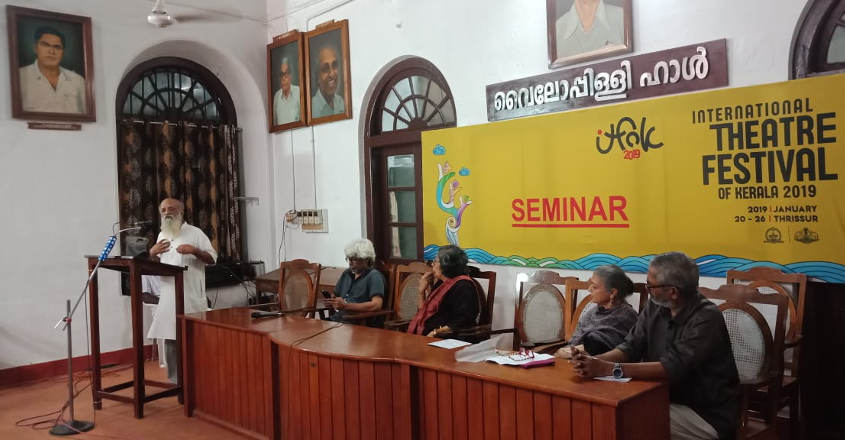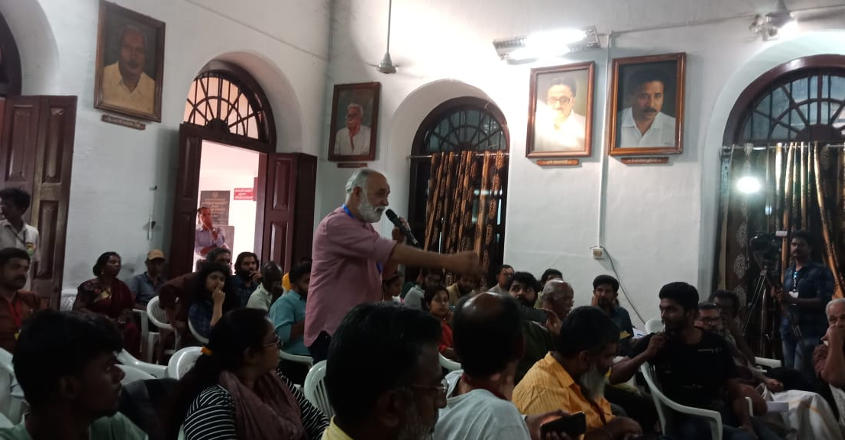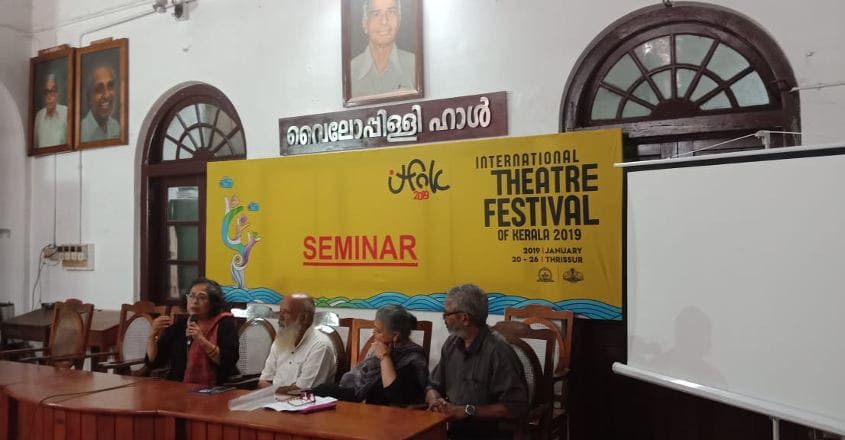'Word' is silenced in Indian theatre, time to give it voice: Theatre scholars

Mail This Article
Thrissur: Increasing cosmopolitanism is weakening the conventional primacy of spoken word in Indian theatre, where plays are becoming more of a spectacle that gives prominence to backstage artistes than actors, according to a seminar at an ongoing global cultural event here.
Dramas are turning out to be extremely non-verbal in the name of multiculturalism, thus tending to cater more to the urban elite at the cost of distancing from rural masses, lamented most speakers at the inaugural symposium of the International Theatre Festival of Kerala (ITFoK) 2019.
A chunk of the panellists reiterated that dialogues alone can authenticate the written literature of plays, which cannot go for an 'unlimited adjustment' by giving up on verbal interactions between characters. The point sparked a range of opinions at the session, ‘Spoken Word, Actor and Scenography in the Modern Indian Theatre Practice’.
The 90-minute segment, which marked the start of a colloquium series spanning five days alongside ITFoK in this central Kerala city, also highlighted the power of theatre to convey the message of a production and its experiential value without the viewer having to understand the literal meaning of spoken words. The January 20-26 ITFoK is being organised by the state government: Kerala Sangeetha Nataka Akademi under the Department of Culture, while the seminars are by the Sahitya Akademi as an autonomous body promoting Malayalam language and literature.
On Monday evening, at the vintage Vailoppilli Hall of the 1956-founded Sahithya Akademi, pioneering Kannada theatre director Prasanna noted that a rising metropolitan culture in the country over the past three decades has started showing its flip side when it comes to modern plays. There is a sustained trend of relying less on the spoken word and instead resort to techniques conceived to be of trans-continental communicability, he said.
“Is this the only way to respond to changing times?” wondered the 67-year-old who lives in Heggodu village of west-central Karnataka. To him, diluting the significance of dialogues amounts to avoiding authentication of the play.

Prasanna, who quit IIT to take up theatre full-time and later form an art collective called Samudaya, observed that the trend of “multiculturalism” in the field began in the mid-1980s with the production of The Mahabharata by English director Peter Brook. The nine-hour stage play (1985) had actors from across races coming together and conveying universal ideas essential to the Indian epic. “It’s all fine, that was a good beginning too. But then we have taken it (non-verbal communication) to an extreme of late,” rued Prasanna, renowned for his propagation of protest plays in rural India.
Veteran actress Arundhati Nag, who moderated the session in which actor-director K A Nandajan did translations, noted at the outset that metropolises were breeding a new generation increasingly alien to mother tongues. “The youngsters in our cities struggle to speak local or regional languages. Our metros are blurring their identity,” said the Bangalore-based artiste, who was born in Delhi (in 1956) and raised partly in Mumbai.
Quite a few of the youth in metros is either confused about oneself or yet to firm themselves up, according to Nag, who acts in movies as well. “How much of language can we set aside (in plays)?” asked the moderator, who runs the 2004-founded Ranga Shankara theatre in the Karnataka capital after her husband, actor Shankar Nag (1954-90).
Chandigarh-based Neelam Mansingh Chowdhry said the spoken word gains its desired shade of meaning not by mere utterance of it but the tone it gains and the context in which it arrives. “From text to performance is a long journey. Words contain a lot of memory and remembrance,” noted the theatre activist. “Good writing (of dialogues) gives words multiple layers (of meaning). A play is just the beginning of interpretation of an idea and not the end of it.”
Chowdhry, 67, said she found it insulting to slot a certain region or its people as one “with only agriculture, a no culture”. To her, “both are so interrelated and interdependent, in the first place”.
The speaker noticed that her compatriots generally tended to ridicule Punjabi as a rough language that can at best be transactional. This, when its words are what have gone into great works like the Sikh religious text of Guru Granth Sahib and the rich musical genre of Sufiana Kalam. Chowdhry emphasised that her plays, experimental or otherwise, sought to carry the lines and spirit of Punjabi poetry.
Modern Malayalam theatre-person Narippatta Raju said scenography in several new-age plays in his native Kerala has ended up to be “needless extravaganza”. Most of the visuals that prop stage scenes are “bad and reactionary”, he noted, highlighting the virtues of minimalism that exists in the state’s classical theatres such as Koodiyattam and Kathakali.
Agreeing with Raju “100 per cent”, Prasanna joined in to say theatre scenography was a construction of the cinema — more so the Hollywood. American romance film ‘Gone With The Wind’ (1939) triggered it all, he claimed. “If Koodiyattam or Kabuki (of Japan) appeals to me as extremely slow, it is my problem; not the art-form’s,” he said.
At this Chowdhry, who is an alumna of Delhi’s National School of Drama (NSD) where Prasanna too did his course, came up with a strong note of dissent. “Am not bothered if a (stage) technique is Indian or not,” she said, intervening. “You cannot slot things nation-wise. Indian culture itself is a mix of so many things. Not singular or stand-alone.”

Chowdhry, though, found support from Raju when she said the director should not control the technicalities of an actor in the production. “I find it extremely uncomfortable when some actors (also actresses) ask at rehearsals if this was the way the director wanted their bit of performance,” she said. “To me, I want the actors to respond the way like to their slot. I may have conceived something, but the actor may do it in some other way that comes across as better than the director’s idea.”
Raju, who hails from the heritage village of Karalmanna near Cherpulassery in Palakkad district, was blunter in his expression. He called most modern-day Malayalam actors “behaving like slaves” (under the director). “Where has their individuality gone!” added the middle-aged scholar who graduated from the School of Drama here under the University of Calicut.
Frontline actor-director M K Raina, seated among the listeners, said Indian theatre performers used to be more versatile. “On stage, (s)he would act, sing, dance and even do acrobatics,” noted the NSD product, 71, a native of Srinagar in Jammu and Kashmir. “Only in the West we had actors who would only act and seldom do related things on stage.”
Author-sociologist Ashis Sengupta from University of North Bengal near Siliguri, another personality in the audience, said spoken words are all adaptable to interpretation. Tacitly toeing the line, Prasanna earlier spoke of an instance where he chose to leave the interpreter silent while watching a dialogues-driven theatre production of Swedish filmmaker Ingmar Bergman (1918-2007).
The seminar series was inaugurated by senior Malayalam writer Vaisakhan, president of the Sahitya Akademi. “Theatre should never ape cinema,” said the 78-year-old fictionist, once an employee with the Indian Railways.
The annual ITFoK had its debut edition in 2008, with Thrissur being the permanent venue.
The 2019 festival features plays from Vietnam, Iran, Sri Lanka, Malaysia and Italy besides India, the seminars have theatre aritstes and scholars such as Sreeja Arangottukara, Sajitha Mathathil, Surabhi, Satish Alekar, C B Sudhakaran, G Kumaravarma, Amitesh Grover, Anjum Katyal, Shibu S Kottaram, Karivelloor Murali, Priyanandan and N R Gramapraksh, among others, besides Raina and Sengupta.


